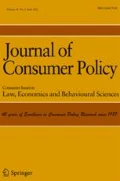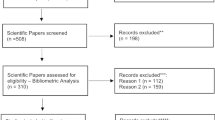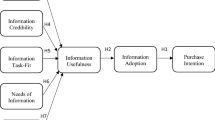Abstract
The article discusses the factors influencing proenvironmental consumer behaviors and the policy implications of knowledge about these influences. It presents a conceptual framework that emphasizes the determining roles of both personal and contextual factors and especially of their interactions. The practical usefulness of the framework is illustrated by evidence of the interactive effects of information and material incentives – typical interventions in the personal and contextual domains, respectively. The author concludes that incentives and information have different functions, so that efforts focused on only one are sometimes misplaced; however, properly deployed, they can have synergistic effects on behavior. Some policy conclusions are drawn for consumer and environmental policy.
Similar content being viewed by others
REFERENCES
Ajzen, I. (1985). From intentions to actions: A theory of planned behavior. In: J. Kuhl & J. Beckmann (Eds.), Action control: From cognition to behavior, pp. 11-39. New York: Springer-Verlag.
Becker, L. J. (1978). The joint effect of feedback and goal-setting on performance: A field study of residential energy conservation. Journal of Applied Psychology, 63, 428-433.
Black, J. S. (1978). Attitudinal, normative, and economic factors in early response to an energy-use field experiment. Madison, WI: University of Wisconsin. Unpublished doctoral dissertation. Dissertation Abstracts International, 39, 436B.
Black, J. S., Stern, P. C., & Elworth, J. T. (1985). Personal and contextual influences on household energy adaptations. Journal of Applied Psychology, 70, 3-21.
Cialdini, R., Kallgren, C., & Reno, R. (1991). A focus theory of normative conduct: A theoretical refinement and re-evaluation. Advances in Experimental Social Psychology, 24, 201-234.
Craig, C. S., & McCann, J. M. (1978). Assessing communication effects on energy consumption. Journal of Consumer Research, 5, 82-88.
Derksen, L., & Gartrell, J. (1993). The social context of recycling. American Sociological Review, 58, 434-442.
Dietz, T., & Stern, P. C. (1995). Toward a theory of choice: Socially embedded preference construction. Journal of Socio-Economics, 24, 261-279.
Ester, P., & Winett, R. A. (1982). Toward more effective antecedent strategies for environmental programs. Journal of Environmental Systems, 11, 201-221.
Fishbein, M. (1979). A theory of reasoned action: Some applications and implications. In: M. M. Page (Ed.), Nebraska Symposium on Motivation 1979, pp. 65-116. Lincoln, NE: University of Nebraska Press.
Frey, B., & Oberholzer-Gee, F. (1996). The cost of price incentives: An empirical analysis of motivation crowding-out. American Economic Review, 87, 746-755.
Gardner, G. T., & Stern, P. C. (1996). Environmental problems and human behavior. Needham Heights, MA: Allyn and Bacon.
Guagnano, G. A., Dietz, T., & Stern, P. C. (1994). Willingness to pay for public goods: A test of the contribution model. Psychological Science, 5, 411-415.
Guagnano, G. A., Stern, P. C., & Dietz, T. (1995). Influences on attitude-behavior relationships: A natural experiment with curbside recycling. Environment and Behavior, 27, 699-718.
Heberlein, T. A., & Baumgartner, R. M. (1985). Changing attitudes and electricity consumption in a time-of-use experiment. Paper presented at M.E.C.2 La Maîtrise de l'Energie et les Consommateurs (Consumer Behaviour and Energy Policy, Second International Conference), Versailles, April.
Heberlein, T. A., & Warriner, G. K. (1983). The influence of price and attitude on shifting residential electricity consumption from on-to off-peak periods. Journal of Economic Psychology, 4, 107-130.
Hirst, E., Berry, L., & Soderstrom, J. (1981). Review of utility home energy audit programs. Energy, 6, 621-630.
Karp, D. G. (1996). Values and their effects on pro-environmental behavior. Environment and Behavior, 28, 111-133.
Kempton, W., Harris, C. K., Keith, J. G., & Weihl, J. S. (1984). Do consumers know what works in energy conservation? In: J. Harris & C. Blumstein (Eds.), What works: Documenting energy conservation in buildings, pp. 429-438. Washington, DC: American Council for an Energy-Efficient Economy.
McDougall, G. H. G., Claxton, J. D., & Ritchie, J. R. B. (1983). Residential home audits: An empirical analysis of the ENER$AVE program. Journal of Environmental Systems, 12, 265-278.
Miller, R. D., & Ford, J. M. (1985). Shared savings in the residential market: A public/private partnership for energy conservation. Baltimore, MD: Energy Task Force, Urban Consortium for Technology Initiatives.
Pardini, A. U., & Katzev, R. D. (1984). The effect of strength of commitment on newspaper recycling. Journal of Environmental Systems, 13, 245-254.
Schwartz, S. H. (1977). Normative influences on altruism. Advances in Experimental Social Psychology, 10, 221-279.
Schwartz, S. H. (1992). Universals in the content and structure of values: Theoretical advances and empirical tests in 20 countries. Advances in Experimental Social Psychology, 25, 1-65.
Schwartz, S. H. (1994). Are there universal aspects in the structure and contents of human values? Journal of Social Issues, 50(4), 19-46.
Seligman, C., Becker, L. J., &. Darley, J. M. (1981). Encouraging residential energy conservation through feedback. In: A. Baum & J. Singer (Eds.), Advances in environmental psychology, Vol. 3, Energy psychological perspectives, pp. 93-113. Hillsdale, NJ: Erlbaum.
Stern, P. C. (1986). Blind spots in policy analysis: What economics doesn't say about energy use. Journal of Policy Analysis and Management, 5, 200-227.
Stern, P. C. (1992a). Psychological dimensions of global environmental change. Annual Review of Psychology, 43, 269-302.
Stern, P. C. (1992b). What psychology knows about energy conservation. American Psychologist, 47, 1224-1232.
Stern, P. C., Aronson, E., Darley, J. M., Hill, D. H., Hirst, E., Kempton, W., & Wilbanks, T. J. (1986). The effectiveness of incentives for residential energy conservation. Evaluation Review, 10, 147-176.
Stern, P. C., Dietz., T., Abel, T., Guagnano, G. A., & Kalof, L. (in press). A valuebelief-norm theory of support for social movements: The case of environmentalism. Human Ecology Review.
Stern, P. C., Dietz, T., & Kalof, L. (1993). Value orientations, gender, and environmental concern. Environment and Behavior, 25, 322-348.
Stern, P. C., Dietz, T., Kalof, L., & Guagnano, G. A. (1995). Values, beliefs, and proenvironmental action: Attitude formation toward emergent attitude objects. Journal of Applied Social Psychology, 25, 1611-1636.
Stern, P. C., & Gardner, G. T. (1981). Psychological research and energy policy. American Psychologist, 36, 329-342.
Stern, P. C., & Oskamp, S. (1987). Managing scarce environmental resources. In: D. Stokols & I. Altman (Eds.), Handbook of environmental psychology, Vol. 2, 1043-1088. New York: Wiley.
Van Liere, K. D., & Dunlap, R. E. (1978). Moral norms and environmental behavior: An application of Schwartz's norm-activation model to yard burning. Journal of Applied Social Psychology, 8, 175-188.
Widegren, Ö. (1998). The new environmental paradigm and personal norms. Environment and Behavior, 30, 75-100.
Winett, R. A., Hatcher, J. A., Fort, T. R., Leckliter, I. N., Love, S. Q., Riley, A. W., & Fishback, J. F. (1982). The effects of videotape modeling and daily feedback on residential electricity conservation, home temperature and humidity, perceived comfort, and clothing worn: Winter and summer. Journal of Applied Behavior Analysis, 15, 155-181.
Winett, R. A., Leckliter, I. N., Chinn, D., Stahl, B., & Love, S. (1985). Effects of television modeling on residential energy conservation. Journal of Applied Behavior Analysis, 18, 33-44.
Author information
Authors and Affiliations
Rights and permissions
About this article
Cite this article
Stern, P.C. Information, Incentives, and Proenvironmental Consumer Behavior. Journal of Consumer Policy 22, 461–478 (1999). https://doi.org/10.1023/A:1006211709570
Issue Date:
DOI: https://doi.org/10.1023/A:1006211709570




